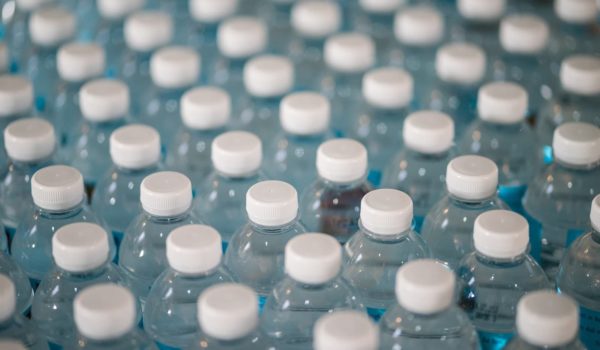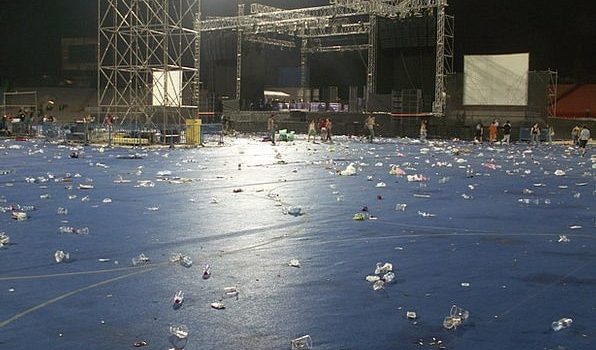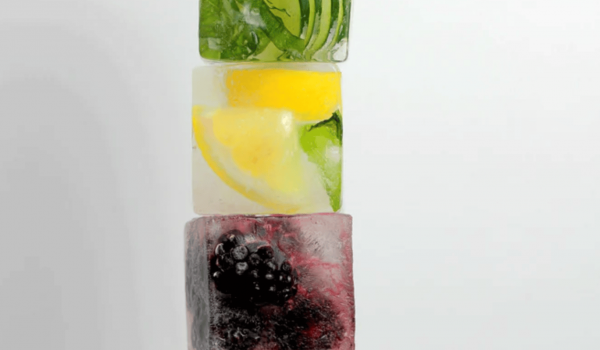Nielsen Music reports that 52 percent of the U.S. population attends a live music event every year, the majority if not all offer single-use plastic bottles of water for sale. Just a few years ago, The Desert Sun reported Coachella – one of the biggest music festivals in the country – contributes to 107 tons of waste with only 20 percent of it recycled. With 125,000 music lovers attending this festival alone, set against the backdrop of the desert heat, the number of plastic water bottles are plentiful to say the least.
Fortunately, Coachella and other music festivals across the nation are implementing initiatives to promote more sustainable concerts. With the majority of Americans saying they feel global warming is personally important, it affects their everyday decisions, including considering their sustainability options wherever they go. Now at 72 percent, the number of people continues to surge, per researchers at Yale and George Mason University.
This issue is on the forefront among the millennial and Gen Z demographics, two of the largest groups attending music festival events every year. They are changing their buying habits with the planet in mind. Many artists and venue operators have already led the charge in its efforts to reduce the negative environmental impact that’s linked with music festivals and other live music events.
Whether it includes carpooling, offering a recycling center or merchandise, eliminating plastic waste, or providing water refill stations, it’s essential for music venues and artists to support these progressive steps in going green. When they take action and promote it consistently, fans and the rest of the public follow suit.
Eco-friendly music festivals and their activities become a primary action rather than a secondary thought. The more this continues to be a long-lasting habit, it shifts how people will approach organizing and attending live concerts in the future. Here are a few ways everyone can pitch in and do their part and make a significant difference in the protection of our magnificent planet.
Increasing the Use of Carpools and Public Transportation
Coachella offers prizes for those participating in Carpoolchella, the initiative that encourages people to ride with four or more people to save on CO2 emissions. Lollapalooza offers a complimentary bike valet through ChainLinks, which provides repairs, maintenance, and bike safety tips for festival goers.
This popular Chicago music festival also partners with Divvy, the city’s bike-sharing system to offer the first ride for free. Other major music festivals encourage rideshare and public transportation to get to and from the venue. They often offer discount codes and/or free rides making it easy for attendees to reconsider their transportation options, if they’re thinking about driving to the event. Not only does it cut down on the gas and CO2 emissions, it’s a money saver for those attending and cuts the stress of traffic and parking for attendees.
Following a Reduce, Reuse, Recycle Mentality
Many music festivals have started to offer compost and recycling bins, in addition to their regular trash containers. Musician Jack Johnson, a long-time environmental advocate, aims for a zero waste tour as part of his efforts to build sustainable concerts. Live Nation also announced its aim to be zero waste through its offices, venues, and events with a 50 percent or higher material recovery rate by 2030.
Having the resources available for people onsite that are regularly emptied and maintained makes it easier to encourage each person to participate when they’re enjoying the festival. In addition, venues and artists are hosting specially designated spots to promote education and additional resources to promote sustainability efforts and other ways people can help outside of the music festival grounds.
Relying on Sustainable Materials and Conservation Efforts
In addition to recycling, concert venues are aiming to go green by using sustainable materials. For example, San Diego’s KAABOO music festival supports this effort by maximizing the use of plant-fiber food-serving materials as well as providing composting stations throughout the venue. They have also implemented a holistic sustainability program, KAABOO Kindness: Land + Sea, which specifically focuses on ocean health and coastal preservation. Its goal is to better understand and continue to improve the environmental footprint of its festival production.
Other performers such as The Dave Matthews Band use sustainable materials whenever possible. Their tour bus is fueled by biodiesel. And they are committed to planting one million trees and invites fans to join this conservation campaign as part of a forest restoration effort with the support of The Dreaming Tree Wines and Docusign.
As performers and venues continue to lead by example and openly encourage their fans and attendees to do the same, it promotes education about climate change and allows people to feel like they can make a difference too. Among the many environmental issues that concern the younger generations of concert goers today include climate change, pollution, and global warming. They are making decisions based on these issues and aren’t afraid to speak out when they’re not addressed.
Eliminating Plastic Waste from All Venues
The sheer amount of plastic waste generated by music festivals worldwide is not a new problem. The total amount reaches numbers into the tons of plastic straws, cups, packaging, and single-use water bottles. It was estimated the Bonnaroo Music and Arts Festival in Tennessee generated over 679 tons of waste in a four-day period a few years ago.
Since then, they, too, have increased their sustainability efforts. In its 2018 annual sustainability report, it illustrated the breakdown of how it diverted 351 tons of waste to be reused, composted, donated, or recycled. Other music festivals and individual concerts have followed suit by being transparent with their goals and achievements.
Eliminating single-use plastics has been a growing cause for most states, particularly California, a state that bans single-use plastic bags and straws. Venues may offer “straws by request” similar to current restaurant policies and providing alternative materials for food and drink offered at these festivals.
In addition to its zero waste efforts, Live Nation will be ending the sale of single-use plastics at all owned and operated venues and events by 2021. Although waste cleanup is part of every music festival experience, eliminating the problem beforehand is instrumental in truly reducing the carbon footprint of those who attend music festivals every year.
Offering Filtered Water Refill Stations
As the sustainable alternative to single-use plastic bottles, making filtered water refill stations easily accessible is key. With tens of thousands of people pouring into a music site all day and often for multiple days, maintaining hydration is a priority. FloWater is a great choice for festival managers to invest in for their attendees for several reasons.
First, it eliminates the need for plastic water bottles. Each person can bring their own reusable container to keep with them throughout the festival. Second, the FloWater Refill Station can handle a high-capacity crowd. It holds seven gallons of purified water at all times, on-demand. The tanks are automatically replenished every time water is dispensed and it can fill up a 24-oz. bottle in under 10 seconds, which helps move lines quickly.
A third benefit is the water is always dispensed at the optimal drinking temperature of 42 degrees. For hot days spent outside in the sunshine, people want purified water that tastes great but also is chilled to perfection. These are only a few of the many reasons why these are a good investment for festival planners and program operators.
By setting up FloWater Refill Stations in various areas of the venue, this is a valuable solution for promoting sustainable concerts and providing attendees a resource they need. It’s no longer about having water refill stations as an added perk to festival experiences, attendees are expecting it as a staple.
The Future of Music Festival Sustainability
Festival organizers, music venues, artists, and fans have banded together to battle climate change and do what they can to reduce their collective carbon footprint. Even within a few years, policies have been updated and expanded to accommodate growing sustainability initiatives. Every year, there are new strategies and opportunities to educate and raise awareness about what can be done to help.
With many future efforts focused on zero waste music festivals and an even greater push for sustainable concerts, it gives people entertainment they’ve loved for years without having to compromise their environmental values. Climate change, global warming, and other issues that affect the planet are vital to the majority of people. When there are ways they can pitch in and help, they will. When festival managers make the effort to make these resources readily available, it’s all that’s needed for everyone to step in and take action immediately. The result is greener, cleaner concert experiences that help to protect the planet. What are considered new ideas now will soon be the benchmark for the future. There will be greater use of environmentally sustainable materials, less or zero plastic waste, while still offering the amenities concert goers desire. Providing fresh, filtered water through FloWater’s Refill Stations will become part of the norm of perpetuating an environmentally friendly experience.
Sources:
- https://www.billboard.com/articles/business/8485063/nielsen-releases-in-depth-statistics-live-music-behavior-360-report;
- https://www.desertsun.com/story/life/entertainment/music/coachella/2017/04/21/coachella-generates-107-tons-solid-waste-each-day-20-gets-recycled/305682001/;
- https://www.nationalgeographic.com/environment/2019/01/climate-change-awareness-polls-show-rising-concern-for-global-warming/;
- https://www.nationalgeographic.com/environment/2019/01/climate-change-awareness-polls-show-rising-concern-for-global-warming/;
- https://www.coastalliving.com/lifestyle/the-environment/jack-johnson-tour-greening-concerts; https://www.ticketnews.com/2019/05/live-nation-green-nation-sustainability-goals/;
- https://www.sandiego.edu/sustainability/news-events/detail.php?_focus=73290; https://earthtalk.org/musicians-music-festivals-go-green/;
- https://www.forbes.com/sites/emanuelabarbiroglio/2019/12/09/generation-z-fears-climate-change-more-than-anything-else/#5c302617501b;










